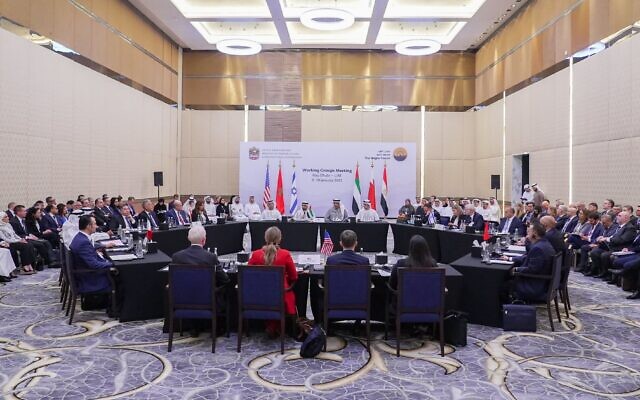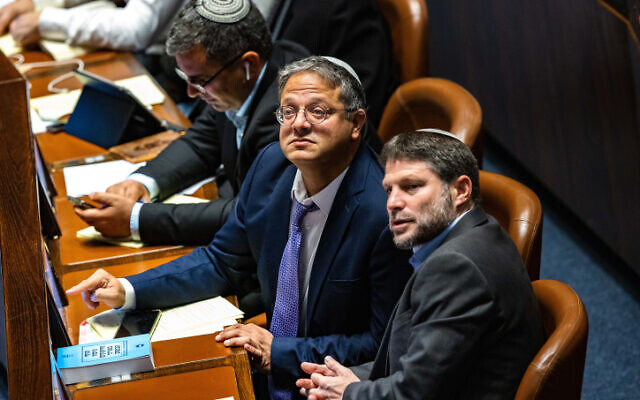After pressing Jerusalem for Ramadan calm, US lauds Israeli handling of holiday rows - The Times of Israel
WASHINGTON — The Biden administration has expressed its satisfaction to Israel over the latter’s handling of security tensions during the holy Islamic month of Ramadan, an Israeli and a US official told The Times of Israel on Tuesday.
The appreciation was conveyed during several conversations Biden officials have held with their Israeli counterparts over the past week, the senior Israeli official said.
The message represented a rare nod of approval from the US to the four-month-old, hardline government of Prime Minister Benjamin Netanyahu, whose efforts to overhaul the judiciary and expand Israel’s presence in the West Bank have led to an intense rebuke from US President Joe Biden himself as well as the summoning of Israel’s ambassador in Washington for a private dress-down.
A senior US official said the Netanyahu government’s conduct had the Biden administration particularly apprehensive as Ramadan approached, given that the holy month in and of itself adds an extra layer of tensions between Israelis and Palestinians and that 2023 once again featured a confluence of Jewish, Muslim and Christian holidays that further complicated matters.
Thursday brought a close to a relatively calm Ramadan, save for the spike in violence in early April due to intense clashes between Israeli police and Palestinians inside Jerusalem’s flashpoint Al-Aqsa Mosque on the Temple Mount.
Israel says its security forces were left with no choice but to raid the mosque before dawn on April 5 after several hundred Palestinians barricaded themselves inside with weapons and explosives that they planned to use to target Israeli police and civilians.
עימותים בהר הבית: עשרות התבצרו במסגד מעבר לשעות המותרות, נעלו את הדלתות ואספו זיקוקים, מקלות ואבנים. לאחר נסיונות הידברות שלא צלחו, במשטרה החלו לפזר באמצעות רימוני הלם את מפרי הסדר, רבים מהם נפצעו. הכוחות נכנסו למסגד, עשרות פורעים ירו לעברם זיקוקים ויידו אבנים. שוטר אחד נפצע ברגל pic.twitter.com/5YLNUbem0C
— נועה ברנס Noa Baranes (@noabaranes10) April 4, 2023
But footage of police brutally beating the Palestinians, some already apprehended, sparked massive uproar and served as a rallying call for Israel’s adversaries across the region.
In the hours and days that followed, dozens of projectiles were fired at Israel from Gaza, Syria and Lebanon. The barrage of 34 rockets from Lebanon was the largest since 2006.
Several other terror attacks targeting Israelis also occurred that week, including a shooting in the West Bank that took the lives of a mother and her two daughters as well as a suspected car-ramming in Tel Aviv that killed an Italian tourist.
On 10 April, a 15-year-old Palestinian was shot and killed by the IDF during an arrest operation near Jericho. While eyewitnesses said the boy was a bystander, the Israeli army insisted that its troops returned fire after being shot at.
As the casualty count climbed, the Biden administration — along with the United Arab Emirates, Egypt and Jordan — intensified their engagement with Israeli officials, privately urging them to exercise restraint, a senior Middle Eastern diplomat told The Times of Israel.

Security forces at the scene of a deadly terror attack in the Northern Jordan Valley, April 7, 2023. (Michael Giladi/Flash90)
Particular emphasis was placed on preventing scenes similar to the ones from the April 5 raid of the Al-Aqsa Mosque, the diplomat said.
On the morning of April 9, a similar dynamic began to unfold, with police saying that a large group of Palestinians had barricaded themselves inside. However, Israel said forces ultimately decided against entering the mosque upon receiving intelligence that those inside were not planning to instigate clashes.
The senior Middle East diplomat laughed at the Israeli explanation and said the police decision to stand down had actually been the result of marathon phone calls by Biden officials, including on the day of the nearly repeated clash.
Two days later, Netanyahu announced that non-Muslims would be barred from entering the Temple Mount for the remainder of Ramadan.
While the decision was in line with longstanding Israeli policy, the days leading up to the announcement saw increased speculation that Netanyahu might change course amid pressure from his far-right coalition partners.
On this issue as well, Biden officials held regular calls with their Israeli counterparts, urging them to stay the course of previous governments.

Israeli police escort Jewish visitors on the Temple Mount, in the Old City of Jerusalem on April 9, 2023. (AP/Mahmoud Illean)
Israel also advanced a series of small measures aimed at financially boosting the cash-strapped Palestinian Authority, a senior National Security Council official told The Times of Israel last week.
“Things could’ve been a lot worse and we got pretty close to a regional war,” said a second US official who highlighted the “dangerous confluence” of Palestinian youth at the Temple Mount and terror groups looking to instigate and exploit tensions there along with some members of Netanyahu’s coalition who have shown a willingness to further escalate hostilities.
While the Biden administration has indicated growing concern over Netanyahu’s ability to reign in his hardline political partners, his conduct over the past several weeks “proved that he can calm things down when he wants to,” the second US official told The Times of Israel.
The prime minister’s handling of the last several weeks could well create the momentum necessary for the reconvening of the Negev Forum, which has been dormant since January amid growing regional dissatisfaction with the Israeli government.
No date has been set for the second-ever ministerial gathering of the Negev Forum but initial talks on the matter have resumed, the Israeli official said.
The senior Middle East diplomat speculated that Israel holding another regional summit with the Palestinian Authority, the US, Egypt and Jordan would expedite the scheduling of the next Negev Forum confab.

Negev Forum participants hold a meeting in Abu Dhabi on January 10, 2022. (UAE Foreign Affairs Ministry)
Netanyahu’s government has already participated in two such gatherings in Aqaba, Jordan and Sharm el-Sheikh, Egypt where the sides committed to temporarily refrain from unilateral measures opposed by the other side. They had also committed to reconvening for a third time in April, but the two US and Israeli officials acknowledged that this would be unlikely by the end of the month given that a date has not yet been set.
However, there apparently remains a limit to Netanyahu’s ability to steer the direction of his government as it pertains to the Palestinians:
Earlier this week, the government submitted an opinion to the High Court of Justice in which it expressed its intention to raze the Palestinian hamlet of Khan al-Ahmar while indicating that it would not do so in the foreseeable future.
The Israel Hayom daily revealed that an initial draft of the opinion included the government’s commitment to refrain from harming the “Sharm process” where the sides agreed to “pursue confidence-building measures, enhance mutual trust, create political horizon, and address outstanding issues through direct dialogue.”

Religious Zionist party leader MK Bezalel Smotrich with Otzma Yehudit party leader MK Itamar Ben Gvir in the Knesset plenum, December 28, 2022. (Olivier Fitoussi/Flash90)
However, references to the Israeli-Palestinian regional summits were removed from the final version of the government’s High Court opinion following pressure from Finance Minister Bezalel Smotrich and National Security Minister Itamar Ben Gvir.
Their influence on Netanyahu’s decisions will likely impact how the premier decides to handle next month’s Jerusalem Day flag march of religious nationalists. The US in the last several years has pushed Israel to change the traditional route of the rally in order to avoid the Damascus Gate and the Muslim Quarter of the Old City, which is widely seen as a provocation, given that extremist participants have used their time there in recent years to chant racist slogans against Arabs and Palestinians.
But Smotrich and Ben Gvir have been among the most prominent participants of the flag march and will likely insist that Netanyahu maintain the traditional route. The senior US official acknowledged that this issue is already on the Biden administration’s radar.

File: MK Bezalel Smotrich, center, waves an Israeli flag during the annual ‘Flags March’ next to Damascus gate, outside Jerusalem’s Old City, June 15, 2021. (AP Photo/Mahmoud Illean)
Meanwhile, substantive talks regarding a long-coveted White House visit for Netanyahu have yet to take place, the Israeli official said, speculating that the US is still seeking more clarity regarding the future of the government’s judicial overhaul effort before moving forward.
Netanyahu agreed to pause the legislative blitz to radically curb the High Court of Justice’s power last month in order to allow for compromise negotiations with the opposition. Those talks have been held several times at President Isaac Herzog’s residence in recent weeks, but they have yet to reach a breakthrough and the coalition may well decide to move forward with parts of the overhaul next month or in June.
Biden’s Tuesday announcement that he’ll be seeking re-election will likely further complicate efforts to schedule a Netanyahu visit to the US, with domestic political considerations playing an even larger role in foreign policy decisions as November 2024 approaches.
The White House and the Prime Minister’s Office declined requests for comment on this story.
from "holiday" - Google News https://ift.tt/lqkLyDY
via IFTTT
Comments
Post a Comment